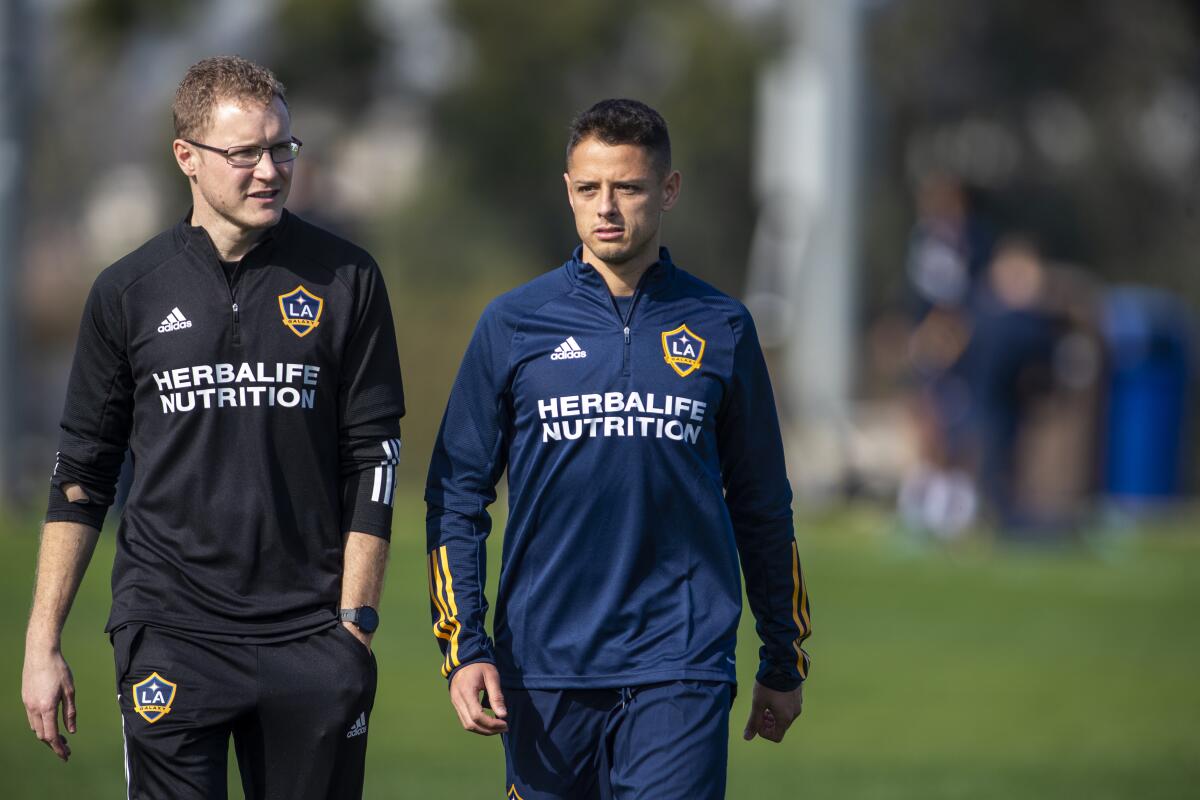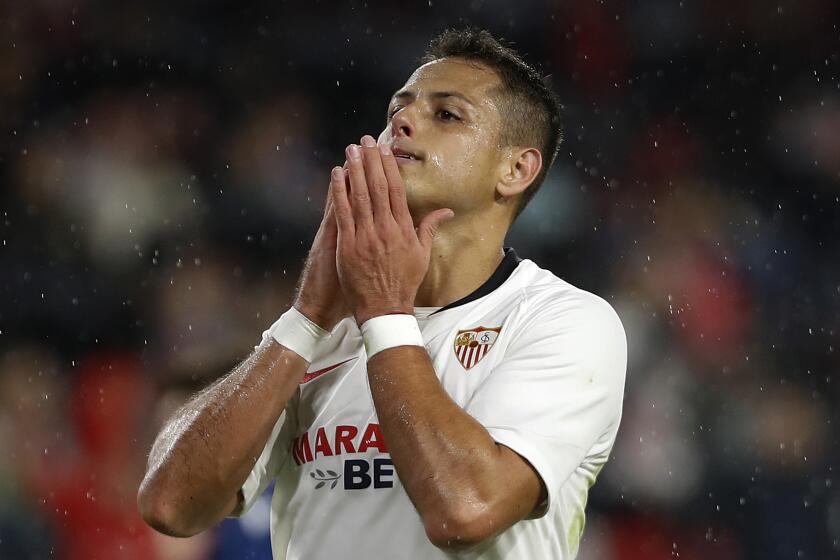Column: Chicharito’s move to MLS represents something — but it’s not retirement

The behind-the-scenes footage was treated like a smoking gun by Major League Soccer’s detractors, evidence that Javier “Chicharito” Hernández’s move to the Galaxy wasn’t what the Mexican striker previously claimed it was.
In a video posted to his YouTube channel, a tearful Hernández was shown calling his father from Spain last week as his transfer from Sevilla was on the verge of completion.
“It’s the beginning of me starting to retire, you know?” Hernández said in Spanish.
The public reaction was predictable, with the statement widely interpreted as an admission that MLS was still a retirement league.
Only it wasn’t.
A day after the video was uploaded to the internet, Hernández was introduced by the Galaxy in a news conference at Dignity Health Sports Park. The 31-year-old Hernandez didn’t clarify his remarks on Thursday as much as remind his audience of exactly what he said.
“It’s the beginning of my retirement,” the bilingual Hernández said in English. “It’s just the beginning of it. We’ll see how long it’s going to be.”
In first interview since joining the Galaxy and MLS, Mexican soccer’s most popular player says he has plenty left to contribute.
He said the period could last a decade, offering a hypothetical scenario in which he finishes his career at 40 in his wife’s native Australia.
Hernández didn’t explain why he was crying on the YouTube video, but he didn’t have to. The answer was on the recording.
“We’re retiring from the European dream,” Hernández told his father.
The Mexican national team’s all-time leading scorer was mourning the culmination of a particular stage of his career, a 10-year span in which he strived to become a dominant striker at the sport’s highest level. That’s in Europe, specifically in one of the continent’s four major domestic leagues or the Champions League.
Hernández scored important goals for Manchester United and Real Madrid, but also never came close to reaching the heights scaled by countryman Hugo Sánchez, who won five Spanish league scoring titles in the 1980s.
Four months ago, Hernández accepted a pay cut to move from West Ham of England to Sevilla of Spain. The transfer represented one final attempt to remain relevant in Europe. The effort failed.

The move to the Galaxy was a formal acknowledgment of something Hernández realized while benched in Sevilla.
His chase was over.
But “retiring from the European dream,” as Hernández called it, shouldn’t be equated with retiring from soccer.
MLS isn’t Spain’s La Liga. But neither is Mexico’s Liga MX and no one would have accused Hernández of moving to a retirement league if he had, say, returned to Chivas of Guadalajara.
Hernández’s remarks in that YouTube video didn’t contradict what he said in his first interview after he signed with the Galaxy — he thinks he has plenty of goals ahead of him, that MLS has improved considerably over the last several years and that he will encounter real competition here.
The perception that MLS is a retirement league is an unfortunate remnant of the league’s early years, when players such as Lothar Matthaus and Walter Zenga exerted minimal effort on the field and were obviously interested in nothing other than cashing checks.

The big-name players who come to MLS aren’t as old as their predecessors. And while most of them are on the downsides of their careers, the league has become competitive enough to punish them if they don’t take the competition seriously.
Hernández’s longtime teammate on the Mexican national team, Giovani dos Santos, was also once a celebrated acquisition for the Galaxy. But his focus wavered and his performance declined, leading to the team cutting him last year.
Known as a pro’s pro, Hernández won’t have any such lapses. In fact, general manager Dennis te Kloese cited Hernández’s character as one of the reasons the Galaxy pursued him when he became available. Te Kloese used to work for Chivas, with whom Hernández started his career.
“From what I know of Javier, he’s ideal,” Te Kloese said in Spanish. “He’s humble. He’s a worker. He will do his work.”
Galaxy players are elated over the team’s signing of Javier ‘Chicharito’ Hernández, but will the Mexican soccer star help deliver an MLS Cup to the team?
The Galaxy will be looking for Hernández to do more than to get on the ends of the passes delivered by wingers Cristian Pavón and Aleksandar Katai. He will be also asked to be the first line of coach Guillermo Barros Schelotto’s defense, pressuring opponents deep in their territory.
The level of play will be lower than to which Hernández has become accustomed, particularly on the defensive side. As such, it’s fair to describe MLS as a stop on the road to retirement. But if that’s what the league represents for Hernández, the opposite is also true for younger players, for whom MLS is a springboard to Europe.
Miguel Almirón parlayed two outstanding seasons with Atlanta United into a move to England, where the 25-year-old attacker is now a key player for Newcastle. LAFC’s Uruguayan attackers, 21-year-old Diego Rossi and 19-year-old Brian Rodriguez, also should have futures in Europe.
Hernández’s words didn’t diminish or damage MLS. Rather, they provided an honest and accurate assessment of where the league stands. MLS isn’t a destination league, but it’s also not a place for a player to go through the motions and be paid solely for the name on the back of his jersey.









